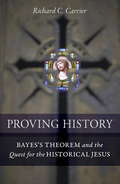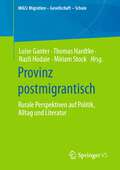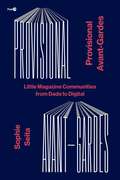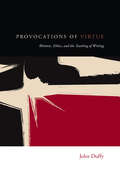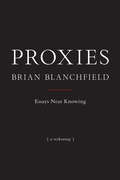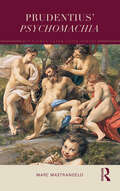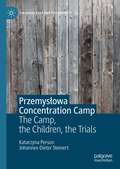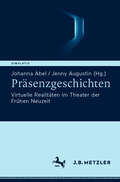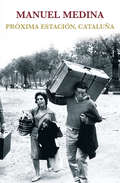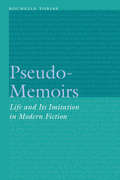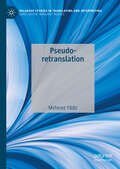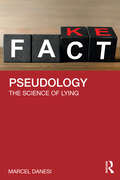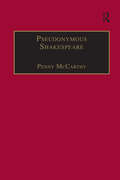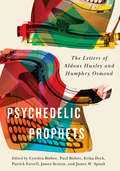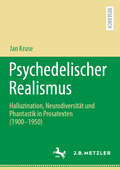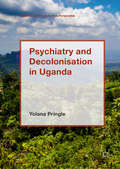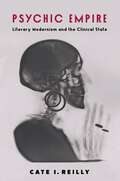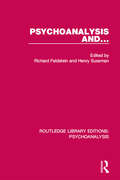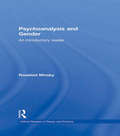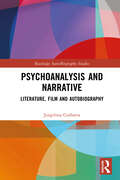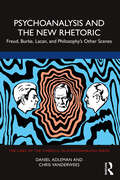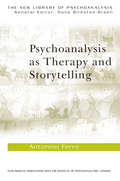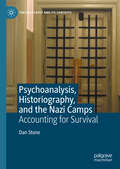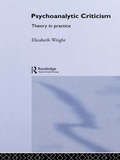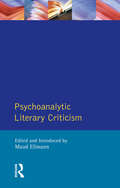- Table View
- List View
Proving History
by Richard C. CarrierAnyone with an interest in historical methods, how historical knowledge can be justified, new applications of Bayes's Theorem, or the study of the historical Jesus will find this book to be essential reading.Almost all experts agree that the Jesus of the Bible is a composite of myth, legend, and some historical evidence. So what can we know about the real Jesus? For more than one hundred and fifty years, scholars have attempted to answer this question. Unfortunately, the quest for the historical Jesus has produced as many different images of the original Jesus as scholars who have studied the subject. The result is a confused mass of disparate opinions with no consensus view of what actually happened at the dawn of Christianity. And this uncertainty is not unique to the historical study of Jesus. The problems related to establishing the reliability of historical criteria apply equally to any historical analysis of the persons and events that have shaped our lives and the beliefs we hold dear. This in-depth discussion of New Testament scholarship and the challenges of history as a whole proposes Bayes's Theorem, which deals with probabilities under conditions of uncertainty, as a solution to the problem of establishing reliable historical criteria. The author demonstrates that valid historical methods--not only in the study of Christian origins but in any historical study--can be described by, and reduced to, the logic of Bayes's Theorem. Conversely, he argues that any method that cannot be reduced to this theorem is invalid and should be abandoned. Writing with thoroughness and clarity, the author explains Bayes's Theorem in terms that are easily understandable to professional historians and laypeople alike, employing nothing more than well-known primary school math. He then explores precisely how the theorem can be applied to history and addresses numerous challenges to and criticisms of its use in testing or justifying the conclusions that historians make about the important persons and events of the past. The traditional and established methods of historians are analyzed using the theorem, as well as all the major "historicity criteria" employed in the latest quest to establish the historicity of Jesus. The author demonstrates not only the deficiencies of these approaches but also ways to rehabilitate them using Bayes's Theorem.
Provinz postmigrantisch: Rurale Perspektiven auf Politik, Alltag und Literatur (MiGS: Migration - Gesellschaft - Schule)
by Miriam Stock Nazli Hodaie Luise Ganter Thomas HardtkeDer Band entwickelt eine postmigrantische Perspektive auf provinzielle oder provinzbezogene Kontexte und Positionierungen und vereinigt dabei literarische Perspektiven mit empirischen Zugängen zu Politik und Alltag. Es werden postmigrantische Aushandlungen in ruralen Kontexten in den Blick genommen und zudem gefragt, wie sich Vorstellungen zur „Provinz“ wie auch zur „Migration“ gegenseitig bedingen, neuformieren und wo dies konkret geschieht.
Provisional Avant-Gardes: Little Magazine Communities from Dada to Digital (Post*45)
by Sophie SeitaWhat would it mean to be avant-garde today? Arguing against the notion that the avant-garde is dead or confined to historically "failed" movements, this book offers a more dynamic and inclusive theory of avant-gardes that accounts for how they work in our present. Innovative in approach, Provisional Avant-Gardes focuses on the medium of the little magazine—from early Dada experiments to feminist, queer, and digital publishing networks—to understand avant-gardes as provisional and heterogeneous communities. Paying particular attention to neglected women writers, artists, and editors alongside more canonical figures, it shows how the study of little magazines can change our views of literary and art history while shedding new light on individual careers. By focusing on the avant-garde's publishing history and group dynamics, Sophie Seita also demonstrates a new methodology for writing about avant-garde practice across time, one that is applicable to other artistic and non-artistic communities and that speaks to contemporary practitioners as much as scholars. In the process, she addresses fundamental questions about the intersections of aesthetic form and politics and about what we consider to be literature and art.
Provocations of Virtue: Rhetoric, Ethics, and the Teaching of Writing
by John DuffyIn Provocations of Virtue, John Duffy explores the indispensable role of writing teachers and scholars in counteracting the polarized, venomous “post-truth” character of contemporary public argument. Teachers of writing are uniquely positioned to address the crisis of public discourse because their work in the writing classroom is tied to the teaching of ethical language practices that are known to moral philosophers as “the virtues”—truthfulness, accountability, open-mindedness, generosity, and intellectual courage. Drawing upon Aristotle’s Nicomachean Ethics and the branch of philosophical inquiry known as “virtue ethics,” Provocations of Virtue calls for the reclamation of “rhetorical virtues” as a core function in the writing classroom. Duffy considers what these virtues actually are, how they might be taught, and whether they can prepare students to begin repairing the broken state of public argument. In the discourse of the virtues, teachers and scholars of writing are offered a common language and a shared narrative—a story that speaks to the inherent purpose of the writing class and to what is at stake in teaching writing in the twenty-first century. This book is a timely and historically significant contribution to the field and will be of major interest to scholars and administrators in writing studies, rhetoric, composition, and linguistics as well as philosophers and those exploring ethics.
Proxies: Essays Near Knowing
by Brian BlanchfieldPast compunction, expressly unbeholden, these twenty-four single-subject essays train focus on a startling miscellany of topics —Foot Washing, Dossiers, Br’er Rabbit, Housesitting, Man Roulette, the Locus Amoenus—that begin to unpack the essayist himself and his life’s rotating concerns: sex and sexuality, poetry and poetics, subject positions in American labor (not excluding academia), and his upbringing in working-class, Primitive Baptist, central-piedmont North Carolina.
Prudentius’ Psychomachia (Routledge Later Latin Poetry)
by Marc MastrangeloThis new translation brings to life Prudentius' Psychomachia, one of the most widely read poems in western Europe from Late Antiquity through the Renaissance. With accompanying notes and introduction, this volume provides a fresh exploration of its themes and influence. The Psychomachia of Prudentius (348–c. 405), an allegorical epic poem of nearly 1,000 lines about the battle between the virtues and the vices for possession of the human soul, led early modern scholars to refer to the late antique poet as "the Christian Vergil." Combining depictions of violent, single combats with allusions to pagan epic poetry, biblical scenes, and Christian doctrine, the poem captures the dynamism of the later Roman Empire in which the pagan world was giving way to a new, Christian Europe. In this volume, the introduction sets the historical and literary context and illuminates the Psychomachia’s prominent role in western literary history. Mastrangelo’s translation aims to capture the rhetorical power of the author’s Roman Christian Latin for the 21st-century reader. The notes provide the reader with in-depth information on Prudentius’ Latinity, the Roman epic tradition, and Christian doctrine. This volume is directed at students and scholars across the disciplines of comparative literature, classics, religion, and ancient and medieval studies, as well as any reader interested in the history and development of literature in the West.
Przemysłowa Concentration Camp: The Camp, the Children, the Trials (The Holocaust and its Contexts)
by Johannes-Dieter Steinert Katarzyna PersonThis book explores one of the most notorious aspects of the German system of oppression in wartime Poland: the only purpose-built camp for children under the age of 16 years in German-occupied Europe. The camp at Przemysłowa street, or the Polen-Jugendverwahrlager der Sicherheitspolizei in Litzmannstadt as the Germans called it, was a concentration camp for children. The camp at Przemysłowa existed for just over two years, from December 1942 until January 1945. During that time, an unknown number of children, mainly Polish nationals, were imprisoned there and subjected to extreme physical and emotional abuse. For almost all, the consequences of atrocities which they endured in the camp remained with them for the rest of their lives. This book focuses on the establishment of the camp, the experience of the child prisoners, and the post-war investigations and trials. It is based on contemporary German documents, post-war Polish trials and German investigations, as well as dozens of testimonies from camp survivors, guards, civilian camp staff and the camp leadership
Präsenzgeschichten: Virtuelle Realitäten im Theater der Frühen Neuzeit (Simulatio. Theatertechniken in Literatur, Medien und Wissenschaft)
by Jenny Augustin Johanna AbelBei einem Blick auf virtuelle Realitäten im frühneuzeitlichen Theater gilt es, unsere vom digitalen Zeitalter geprägten Konzepte der Virtualität und Präsenz zu revidieren. Auf dem Gebiet der Kulturen der Romania haben multiple Präsenz- und Virtualitätsverständnisse eine lange und kontroverse Geschichte. In der Auseinandersetzung mit der Vorgeschichte erweiterter Realitätserfahrungen am Modell des Theaters geht es vor allem um die Einbettung von Vergegenwärtigungstechniken in verflochtene Geschichten und vielschichtige Narrationen vom wirkmächtig Virtuellen. Hier werden daher Präsenzgeschichten im Plural in diversen Medien und epistemischen Erzeugungskontexten durchgespielt.
Próxima estación, Cataluña
by Manuel MedinaLa historia de la inmigración andaluza en Cataluña, y de cómo ésta acogió y protegió a los trabajadores sin importar su procedencia. La creación de La Caixa, del Hospital Vall d'Hebrón, del hotel Casa Fuster, de Radio Tele-Taxi, a través de sus protagonistas. Manuel Medina pertenece a la generación de los niños del hambre, nacidos en los difíciles años de la posguerra. Su infancia transcurrió en las duras tierras de Jaén, en la Cañada de la Fuensanta, donde la necesidad dirigía estas vidas que contaban con el amor de la familia como único patrimonio. En este ambiente, y cuando apuntaba la adolescencia en los años cincuenta, empezó a ver cómo gran parte de su familia emigraba a Cataluña en busca, ya no de una vida mejor, sino tan sólo de la posibilidad de comer todos los días. Hoy, sesenta años después de que sus tíos y primos comenzaron a coger el tren de la emigración, el autor realiza un viaje por Cataluña en busca de aquellos viajeros del hambre. Sus historias son muy distintas, mientras unos apenas consiguieron cubrir las necesidades vitales, otros alcanzaron un nivel de vida y éxito profesional que ni podían imaginar que existían. Nombres de sobra conocidos: Justo Molinero, José Manuel Lara, Enrique Morente, Paco Ibáñez,... acompañan a personalidades de allí como Francesc Moragas, Isidro Fainé, Antoni Durán i Lleida, Joan Manuel Serrat, Jordi Pujol, Artur Mas, etc. La familia Medina, y otras provenientes de Cataluña, viven hoy perfectamente integradas en la sociedad catalana, lo mismo que muchos otros emigrantes con los que el autor se ha ido encontrando en el final de este viaje que comenzó hace más de medio siglo y que tenía por Próxima estación, Cataluña.
Pseudo-Memoirs: Life and Its Imitation in Modern Fiction (Frontiers of Narrative)
by Rochelle TobiasPseudo-Memoirs redefines the notion of fiction itself, a form that has all too often been understood in terms of its capacity to produce a seeming reality. Rochelle Tobias argues that the verisimilitude of the novel derives not from its object but from the subjectivity at its base. What generates the plausibility of fiction is not the referentiality of its depictions but the intentionality of consciousness. Edmund Husserl developed the idea that consciousness is always intentional in the sense that it is directed outside itself toward something that it does not find so much as it constitutes as an object. Pseudo-memoirs reveal the full implications of this position in their double structure as the tale of their own telling or the fiction of life-writing. In so doing they reveal how the world of fiction is constructed, but more important they bring to the fore the idealist premises that fuel the novel and guarantee its truth, even when it remains an invention of the imagination. Rochelle Tobias explores novels by Thomas Mann, Robert Walser, Thomas Bernhard, and W. G. Sebald in conjunction with philosophical and theoretical texts by René Descartes, Husserl, Friedrich Nietzsche, György Łukács, Roland Barthes, and Maurice Blanchot.
Pseudo-retranslation (Palgrave Studies in Translating and Interpreting)
by Mehmet YildizThis book presents pseudo-retranslations as a new phenomenon of translational intertextuality, revealing how pseudo-retranslations establish large networks of intertextuality across academic works, how academic authors have recourse to this procedure as they create their academic texts, and how pseudo-retranslations contribute to the dissemination of translation-distorted scholarly knowledge and lead to epistemically polluted academic ecosystems. Pseudo-retranslation can be defined as an academic author’s partial or complete exploitation of another academic author’s translation and presenting it as a retranslation of the source text. This phenomenon, first documented in Yildiz (2021), arises from academic authors’ failure to refer to or translate primary sources – particularly in English. Since there occurs no actual retranslation process, this procedure is called pseudo-retranslation. Using a range of academic texts from the Turkish context as case studies, the author presents the integral constituents of this phenomenon, and the behavioural patterns of its renderers. This book will be of particular interest to academics and postgraduates in the field of translation studies and (corpus) linguistics.
Pseudology: The Science of Lying
by Marcel DanesiIn an age where fake news, conspiracy theories, and outright lies by political and cultural leaders are commonplace, we may be becoming accustomed to lying, or worse, even immune to it. Pseudology unravels the reasons for this by describing a “science of lying” that looks at various aspects of this trait, from how it affects the brain to how it distorts perception.Interest in lying goes back to antiquity and writing and debate has only increased in the present day, but what is missing is a treatment that synthesizes the work from linguists, political scientists, anthropologists, psychologists, neuroscientists, and sociologists, tying them to the philosophical and literary views of lying throughout history. Such a treatment can be called "pseudology": an interdisciplinary science for classifying, collating, and assessing ideas about lying. This book is a comprehensive treatment of pseudology, emphasising the importance of studying lying in our current climate. Pseudology addresses questions such as:• What is a lie?• Why do we lie?• Why are we so susceptible to lying?• How does lying activate false beliefs and generate hatred of others?• How has lying shaped the course of history (at least to some extent)?• How has lying been adopted as a basic thematic element in literature and the arts?Synthesising research from a broad range of disciplines and from the perspective of a leading cognitive linguist, this text weaves ideas and theories about lying cohesively into an overall interdisciplinary science. This landmark book is vital for students and scholars of language as well as anyone interested in politics, sociology, or psychology.
Pseudonymous Shakespeare: Rioting Language in the Sidney Circle
by Penny McCarthyAn investigation into modes of early modern English literary 'indirection,' this study could also be considered a detective work on a pseudonym attached to some late sixteenth-century works. In the course of unmasking 'R.L.', McCarthy scrutinizes devices employed by writers in the Sidney coterie: punning, often across languages; repetitio-insistence on a sound, or hiding two persons 'under one hood'; disingenuous juxtaposition; evocation of original context; differential spelling (intended and significant). Among McCarthy's stunning-but solidly underpinned-conclusions are: Shakespeare used the pseudonym 'R.L.' among other pseudonyms; one, 'William Smith', was also his 'alias' in life; Shakespeare was at the heart of the Sidney circle, whose literary programme was hostile to Elizabeth I; and his work, composed mainly from the late 1570s to the early 90s, occasionally 'embedded' in the work of others, was covertly alluded to more often than has been recognized.
Psychedelic Prophets: The Letters of Aldous Huxley and Humphry Osmond (McGill-Queen's/Associated Medical Services Studies in the History of Medicine, Health, and Society #48)
by Patrick Farrell Erika Dyck Cynthia Carson Bisbee Paul Bisbee James Sexton James SpisakAldous Huxley (1894–1963) was the author of nearly fifty books and numerous essays, best known for his dystopian novel Brave New World. Humphry Osmond (1917–2004) was a British-trained psychiatrist interested in the biological nature of mental illness and the potential for psychedelic drugs to treat psychoses, especially schizophrenia. In 1953, Huxley sent an appreciative note to Osmond about an article he and a colleague had published on their experiments with mescaline, which inspired an initial meeting and decade-long correspondence. <P><P> This critical edition provides the complete Huxley-Osmond correspondence, chronicling an exchange between two brilliant thinkers who explored such subjects as psychedelics, the visionary experience, the nature of mind, human potentialities, schizophrenia, death and dying, Indigenous rituals and consciousness, socialism, capitalism, totalitarianism, power and authority, and human evolution. <P><P>There are references to mutual friends, colleagues, and eminent figures of the day, as well as details about both men's personal lives. The letters bear witness to the development of mind-altering drugs aimed at discovering the mechanisms of mental illness and eventually its treatment. <P><P>A detailed introduction situates the letters in their historical, social, and literary context, explores how Huxley and Osmond first coined the term "psychedelic," contextualizes their work in mid-century psychiatry, and reflects on their legacy as contributors to the science of mind-altering substances. <P><P> Psychedelic Prophets is an extraordinary record of a full correspondence between two leading minds and a testament to friendship, intellectualism, empathy, and tolerance. The fact that these sentiments emerge so clearly from the letters, at a historical moment best known for polarizing ideological conflict, threats of nuclear war, and the rise of post-modernism, reveals much about the personalities of the authors and the persistence of these themes today.
Psychedelischer Realismus: Halluzination, Neurodiversität und Phantastik in Prosatexten (1900–1950)
by Jan KruseDas vorliegende Buch liefert ein neues literaturwissenschaftliches Analyseverfahren, mit dem veränderte Bewusstseinszustände in Texten analysiert werden können. Dabei werden auch Erkenntnisse aus anderen Wissenschaftsrichtungen, wie der Bewusstseins- bzw. Neurophilosophie und der Sozialpsychiatrie, miteinbezogen und zu einer interdisziplinären und intermedialen Verfahrensweise verwoben, die anschließend auf literarische Texte angewandt wird. Im Mittelpunkt der Analyse steht die Konzeption einer neuen Textsorte im Bereich der Prosa, die als Psychedelischer Realismus bezeichnet wird. Untersuchungsgegenstand sind deutschsprachige Texte aus der ersten Hälfte des 20. Jahrhunderts, in denen veränderte Bewusstseinszustände ästhetisch dargestellt sind. Bei der ausgewählten Literatur handelt es sich sowohl um nicht-kanonische Texte (beispielsweise von Oscar A. H. Schmitz, Salomo Friedlaender, Hanns Heinz Ewers) als auch kanonische (etwa von Thomas Mann, Hermann Hesse, Ernst Jünger). Der Autor geht davon aus, dass Texte, in denen veränderte Bewusstseinszustände vorkommen, gemeinsame inhaltliche und formale Merkmale aufweisen.
Psychiatry and Decolonisation in Uganda (Mental Health in Historical Perspective)
by Yolana PringleThis open access book investigates psychiatry in Uganda during the years of decolonisation. It examines the challenges facing a new generation of psychiatrists as they took over responsibility for psychiatry at the end of empire, and explores the ways psychiatric practices were tied to shifting political and development priorities, periods of instability, and a broader context of transnational and international exchange. At its heart is a question that has concerned psychiatrists globally since the mid-twentieth century: how to bridge the social and cultural gap between psychiatry and its patients? Bringing together archival research with oral histories, Yolana Pringle traces how this question came to dominate both national and international discussions on mental health care reform, including at the World Health Organization, and helped spur a culture of experimentation and creativity globally. As Pringle shows, however, the history of psychiatry during the years of decolonisation remained one of marginality, and ultimately, in the context of war and violence, the decolonisation of psychiatry was incomplete.
Psychic Empire: Literary Modernism and the Clinical State (Modernist Latitudes)
by Cate I. ReillyIn nineteenth-century imperial Germany and the Austro-Hungarian Empire, new scientific fields like psychophysics, empirical psychology, clinical psychiatry, and neuroanatomy transformed the understanding of mental life in ways long seen as influencing modernism. Turning to the history of psychiatric classification for mental illnesses, Cate I. Reilly argues that modernist texts can be understood as critically responding to objective scientific models of the psyche, not simply illustrating their findings. Modernist works written in industrializing Central and Eastern Europe historicize the representation of consciousness as a quantifiable phenomenon within techno-scientific modernity.Looking beyond modernism’s well-studied relationship to psychoanalysis, this book tells the story of the non-Freudian vocabulary for mental illnesses that forms the precursor to today’s Diagnostic and Statistical Manual of Mental Disorders. Developed by the German psychiatrist Emil Kraepelin in the 1890s, this psychiatric taxonomy grew from the claim that invisible mental illnesses were analogous to physical phenomena in the natural world. Reilly explores how figures such as Georg Büchner, Ernst Toller, Daniel Paul Schreber, Nikolai Evreinov, Vsevolod Ivanov, and Santiago Ramón y Cajal understood the legal and political consequences of representing mental life in physical terms. Working across literary studies, the history of science, psychoanalytic criticism, critical theory, and political philosophy, Psychic Empire is an original account of modernism that shows the link between nineteenth-century scientific research on the mental health of national populations and twenty-first-century globalized, neuroscientific accounts of psychopathology and sanity.
Psychoanalysis and ...: The Sublime And The Grandiose In Literature, Psychopathology, And Culture (Routledge Library Editions: Psychoanalysis)
by Henry Sussman Richard FeldsteinOriginally published in 1990, Psychoanalysis and… brings together essays by critics whose work demonstrates the lively interpenetration of psychoanalysis and other disciplines. Andrew Ross investigates psychoanalysis and Marxist thought; Joel Fineman reads the "sound of O" in Othello; Jane Gallop asks "Why does Freud giggle when the women leave the room?"; and Ellie Ragland-Sullivan examines Lacan’s seminars on James Joyce. This stimulating collection of work should still be required reading, especially for students of literature. But Psychoanalysis and… demonstrates that psychoanalysis – and theoretical criticism, and feminism, and Lacanian theory, and semiotics, and Marxism, and deconstruction, and literary criticism – was, at the time, a rich and expanding terrain.
Psychoanalysis and Gender: An Introductory Reader (Critical Readers in Theory and Practice)
by Rosalind MinskyWhat is object-relations theory and what does it have to do with literary studies? How can Freud's phallocentric theories be applied by feminist critics? In Psychoanalysis and Gender: An Introductory Reader Rosalind Minsky answers these questions and more, offering students a clear, straightforward overview without ever losing them in jargon.In the first section Minsky outlines the fundamentals of the theory, introducing the key thinkers and providing clear commentary. In the second section, the theory is demonstrated by an anthology of seminal essays which includes:* Feminity by Sigmund Freud* Envy and Gratitude by Melanie Klein* An extract from Transitional Objects and Transitional Phenomena by Donald Winnicot* The Meaning of the Phallus by Jacques Lacan* An extract from Women's Time by Julia Kristeva* An extract from Speculum of the Other Woman by Luce Irigaray
Psychoanalysis and Narrative: Literature, Film and Autobiography (ISSN)
by Jorgelina CorbattaPsychoanalysis and Narrative analyzes narrative in literary fiction, film, and autobiography through different psychoanalytic lenses including gender and socio-cultural perspectives. This book aims to demonstrate how fictionists and film makers have intuitively developed – through their own creativity – many of the psychoanalytic discoveries about the human mind. Subverting the usual direction of “applied psychoanalysis,” the book goes from creativity to psychoanalysis, and focuses on four internationally known Argentine writers: Jorge Luis Borges, Julio Cortázar, Manuel Puig, and Luisa Valenzuela; two Argentine women filmmakers, Lucrecia Martel and Lucía Puenzo; and French essayist and writer Serge Doubrovsky. This volume will be of interest to students and academics interested in autobiography and autofiction.
Psychoanalysis and the New Rhetoric: Freud, Burke, Lacan, and Philosophy's Other Scenes (The\lines Of The Symbolic In Psychoanalysis Ser.)
by Chris Vanderwees Daniel AdlemanPsychoanalysis and the New Rhetoric: Freud, Burke, Lacan, and Philosophy's Other Scenes is an innovative work that places the fields of psychoanalysis and rhetoric in dynamic resonance with one another. The book operates according to a compelling interdisciplinary conceit: Adleman provocatively explores the psychoanalytic aspects of rhetoric and Vanderwees probes the rhetorical dimensions of psychoanalytic practice. This thoroughly researched text takes a closer look at the "missed encounter" between rhetoric and psychoanalysis. The first section of the book explores the massive, but underappreciated, influence of Freudian psychoanalysis on Kenneth Burke’s "new rhetoric." The book’s second section undertakes sustained investigations into the rhetorical dimensions of psychoanalytic concepts such as transference, free association, and listening. Psychoanalysis and the New Rhetoric then culminates in a more comprehensive discussion of Lacanian psychoanalysis in the context of Kenneth Burke’s new rhetoric. The book therefore serves as an invaluable aperture to the fields of psychoanalysis and rhetoric, including their much overlooked disciplinary entanglement. Psychoanalysis and the New Rhetoric will be of great interest to scholars of psychoanalytic studies, rhetoric, language studies, semiotics, media studies, and communication studies.
Psychoanalysis as Therapy and Storytelling (The New Library of Psychoanalysis)
by Antonino FerroIs psychoanalysis a type of literature? Can telling 'stories' help us to get at the truth? Psychoanalysis as Therapy and Storytelling examines psychoanalysis from two perspectives - as a cure for psychic suffering, and as a series of stories told between patient and analyst. Antonino Ferro uses numerous clinical examples to investigate how narration and interpretation are interconnected in the analytic session. He draws on and develops Bion's theories to present a novel perspective on subjects such as: psychoanalysis as a particular form of literature sexuality as a narrative genre or dialect in the analyst's consulting room delusion and hallucination acting out, the countertransference and the transgenerational field play: characters, narrations and interpretations. Psychoanalytic clinicians and theoreticians alike will find the innovative approach to the analytic session described here of great interest. Winner of the 2007 Sigourney Award.
Psychoanalysis, Historiography, and the Nazi Camps: Accounting for Survival (The Holocaust and its Contexts)
by Dan StoneIn the postwar years, Dutch survivors Eddy de Wind, Louis Micheels, and Elie A. Cohen, who went on to become practicing psychoanalysts, penned accounts of their survival of the Nazi camps. Their sober assessments contrast sharply with those by Bruno Bettelheim and Viktor Frankl, which emphasized decisiveness, 'positive thinking', and resistance, missing the fact that many Holocaust victims with those characteristics or other qualities did not survive. De Wind’s, Micheels’ and Cohen’s accounts are more sober, (self-)critical, and shaped by analytical practice. By analyzing them anew and comparing them with accounts by female doctors who survived Block 10 in Auschwitz, this book argues that their theories of survival accord with contemporary sensibilities in psychoanalysis and Holocaust historiography. Psychoanalytic concepts have changed over time in response to greater understanding of the Holocaust and recent Holocaust historiography makes us more receptive to insights that were unfashionable in the first postwar decades.
Psychoanalytic Criticism: A Reappraisal (New Accents Ser.)
by Elizabeth WrightFirst published in 2002. Routledge is an imprint of Taylor & Francis, an informa company.
Psychoanalytic Literary Criticism (Longman Critical Readers)
by Maud EllmannThis collection of essays provides students of literary critical theory with an introduction to Freudian methods of interpretation, and shows how those methods have been transformed by recent developments in French psychoanalysis, particularly by the influence of Jacques Lacan. It explains how classical Freudian criticism tended to focus on the thematic content of the literary text, whereas Lacanian criticism focuses on its linguistic structure, redirecting the reader to the words themselves. Concepts and methods are defined by tracing the role played by the drama of Oedipus in the development of psychoanalytic theory and criticism. The essays cover a wide generic scope and are divided into three parts: drama, narrative and poetry. Each is accompanied by explanatory headnotes giving clear definitions of complex terms.
